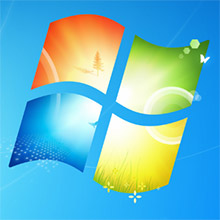 This is the final post a 3-part review of my experience with Microsoft Windows 7 after one month. In part one, we discussed installation and the interface. Part 2 covered productivity, software and security. In today’s final part, we examine performance and Windows future.
This is the final post a 3-part review of my experience with Microsoft Windows 7 after one month. In part one, we discussed installation and the interface. Part 2 covered productivity, software and security. In today’s final part, we examine performance and Windows future.
Performance
If you were expecting Windows 7 to be significantly faster than Vista, you’re going to be disappointed.
Actually, that’s not quite true — it depends on your system. If you have a reasonably modern PC, ensured Vista was up-to-date, and kept your system clean, the speed improvements in Windows 7 will be negligible. Sorry Microsoft — I may not have benchmark figures to back that up, but Windows 7 certainly doesn’t feel any faster to me.
However, I suspect you’ll notice speed improvements if you’re running Vista on older hardware or have a clogged-up system that would benefit from a clear out.
In my experience, boot times are similar, although only because Vista has improved within the past few months. It takes my laptop around 40-50 seconds to boot followed by another 20-30 seconds to log in. However, Vista was almost unusable for 5 minutes while it pre-cached every application it thought I could feasibly use. Windows 7 is better, although it’s still a little sluggish immediately after a cold boot.
Memory management has improved and disk activity has been greatly reduced. In addition, sleeping, hibernating and resuming are much faster (the menu is also more logical now Microsoft has removed the 57 stupid options offered by Vista!)
Laptop users should experience longer battery life and your fan noise will be noticeably quieter than before!
The Future
Microsoft are yet to reveal their plans for Windows 8 and beyond. A few “leaks” suggest they’re planning a 128-bit architecture, but that will certainly depend on processor and hardware manufacturers. And it won’t help the 32/64-bit confusion.
However, Google’s Chrome OS will be released in 2010. It has the potential to change the rules of the game, but I’m not convinced many businesses are ready to consider Windows alternatives. I suspect Microsoft will keep doing the same and Windows 8 will be evolutionary rather than revolutionary. They tried to be radical with Longhorn (the original vision for Vista) and it failed dismally.
Summary
To me, the most significant improvement to Windows 7 is that you forget it’s there. It’s stable, works well, doesn’t nag you, and offers good performance. It’s what an OS should be: a way to launch programs and manage files. That may appear obvious, but I think Microsoft lost its way when they started assuming the OS was more important than the applications it ran (Apple take note!)
The OS may not be a huge step beyond Vista, but it’s ironed out the problems and addressed the criticisms. If you like Vista and it’s working well, the new OS won’t offer much that’s new. However, once you’ve tried Windows 7, you won’t go back.
In my opinion, the best points about Windows 7 are:
- the UI improvements
- libraries and jumplists
- less intrusive UAC
- XP Mode
- no unnecessary software installed
- good performance and battery life
And the worst points are:
- cold starts are still fairly slow
- the lack of native 64-bit software and the confusion it brings
- inconsistent program interfaces and styles
- crashing gadgets
- few Vista users will notice significant improvements
Windows 7 is the first version I’ve purchased (other than receiving OEM versions with PC hardware) and I don’t regret the decision. The Vista improvements may be marginal, but that OS received bad press from which it never recovered. With Windows 7, Microsoft are hoping to change people’s perception and it appears to be working.
Microsoft are increasing their prices in the new year, so don’t hold off if you’re intending to purchase Windows 7. The current Amazon offers are:
US Amazon.com:
- Windows 7 Home Premium Upgrade — $110
- Windows 7 Home Premium (full version) — $180
- Windows 7 Professional Upgrade — $175
- Windows 7 Professional (full version) — $260
- Windows 7 Ultimate Upgrade — $200
- Windows 7 Ultimate (full version) — $292
UK Amazon.co.uk:
- Windows 7 Home Premium Upgrade — £65
- Windows 7 Home Premium (full version) — £110
- Windows 7 Professional Upgrade — £139
- Windows 7 Professional (full version) — £150
- Windows 7 Ultimate Upgrade — £150
- Windows 7 Ultimate (full version) — £166
Remember to consider Professional or Ultimate if you want the full benefit of XP Mode.
See also:
Craig is a freelance UK web consultant who built his first page for IE2.0 in 1995. Since that time he's been advocating standards, accessibility, and best-practice HTML5 techniques. He's created enterprise specifications, websites and online applications for companies and organisations including the UK Parliament, the European Parliament, the Department of Energy & Climate Change, Microsoft, and more. He's written more than 1,000 articles for SitePoint and you can find him @craigbuckler.
